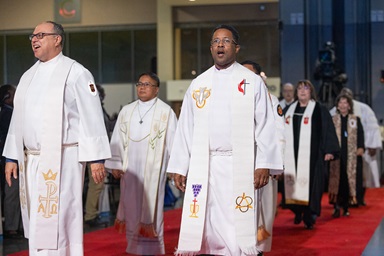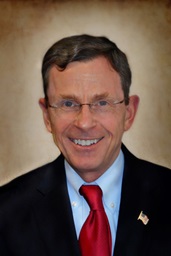Key points:
• The board of The United Methodist Church’s finance agency approved adding the term “non-binary” alongside “male” and “female” on church statistical forms.
• The change only affects U.S. congregations.
• The board vote was not unanimous.
United Methodist congregations in the U.S. will soon have a new way to break down the gender of their members.
By a voice vote June 25, the General Council on Finance and Administration board approved revising local-church statistical forms to include “non-binary” alongside the categories of “male” and “female.”
The change will take effect with forms for the 2021 collection year and will only affect the denomination’s data collection in the U.S.
“We currently only collect local-church statistics in the U.S.,” explained Rick King, the agency’s chief financial officer.
GCFA also plans to ask U.S. annual conferences — church regional governing bodies — to include the number of non-binary clergy in their Business of Annual Conference records. The finance agency expects to send information on these additions to church data collectors in July.
GCFA’s data includes totals — not individuals’ names.
“Non-binary” is a commonly used term for people whose gender identity falls outside the man-woman binary. A study published this month by the Williams Institute at the UCLA School of Law found that about 11% of the LGBTQ adults, ages 18 to 60, identify as non-binary. That translates to about 1.2 million U.S. adults.
The current United Methodist statistical forms ask pastors to tally the number of female and male members and then give a total membership for the two. However, those gender categories have left some members feeling counted out.
The board made the change after hearing from U.S. annual conference treasurers who have responsibility for collecting membership data from local churches.
“We are having issues reporting people with pastors calling our office and saying: ‘What do I do here?’” said Christine Dodson, North Carolina Conference treasurer and the GCFA board’s vice president.
“Quite frankly, I’ve had a pastor tell me, ‘I’m not going to force a person to choose one or the other when they have told me how they identify.’”
Sharon Dean, GCFA’s chief communications officer, said that the agency gets requests for information from various United Methodist groups about gender distribution.
“We’ve also heard from around the connection that some annual conferences and some other organizations are already using a third choice,” Dean said. “And so to be consistent with requests that come in, we might include this additional selection.”
Of the 18 GCFA board members present, only one board member voted no to the change.
“I’m appreciative of the recognition of all God’s people, but I am also cautious that we are making a decision that appears to affect less than half our global constituency,” said the Rev. Steve Wood, the board member who is also lead pastor of Mount Pisgah United Methodist Church in Johns Creek, Georgia.
“I’m just wondering if we are creating more angst than we are creating benefits, so I have to speak against it.”
Per-Endre Bjørnevik, a board member from Norway, is chair of the Connectional Outreach Committee that recommended the revision. He as well as board members from Côte d’Ivoire and the Philippines voted for the change.
The statistical-form revision comes as The United Methodist Church faces a possible split after decades of intensifying debate over same-sex weddings and the ordination of “self-avowed practicing” gay clergy.
The Book of Discipline, the denomination’s policy book, says all people are of sacred worth but states that “the practice of homosexuality” is “incompatible with Christian teaching.”
However, GCFA staff confirmed that adding non-binary to the forms does not conflict with any paragraph in the Discipline. Board members also concluded the change is not in conflict with any legislation related to sexuality heading to the pandemic-delayed General Conference, now scheduled for 2022.
The Discipline takes no stance on the ordination of non-binary or transgender people. In 2019, the Rev. M Barclay became the first openly “non-binary trans person” to be ordained a United Methodist deacon, according to Reconciling Ministries Network. The network advocates for full inclusion of LGBTQ people in the life of the church.
“While it will take much more substantial change in policy and practice for the UMC to be a positive force in the lives of queer and/or trans people, I celebrate the effort of those who are striving to honor the existence of non-binary people in their communities,” Barclay said by e-mail. “Lives depend on this seed of change being nurtured in all contexts.”
Non-binary identity is still a new concept to many people, acknowledged board member and California-Nevada Conference Bishop Minerva G. Carcaño. In the spirit of learning together, she suggested adding a commonly held definition of what non-binary means to statistical forms.
“I know for me, it’s been a journey of learning,” she said.
Dean said she would work with the agency’s data services department to add the definition.
Dean and others cautioned that whenever a form change takes place, it takes a while for church leaders to send in additional data.
Ken Ow, a board member from the Baltimore-Washington Conference, also cautioned that pastors should not try to guess how people identify as they report local-church data.
Board members largely spoke with support for the change.
“I think it reflects that the church is aware that it’s a reality,” said the Rev. Sandra Olewine, who starts July 1 as a district superintendent in the California-Pacific Conference. “And it is a way for the church, even in its forms, to begin to acknowledge more of the fullness of who we are as human beings.”
Hahn is assistant news editor for UM News. Contact her at (615) 742-5470 or [email protected]. To read more United Methodist news, subscribe to the free Daily or Weekly Digests.
Like what you're reading? Support the ministry of UM News! Your support ensures the latest denominational news, dynamic stories and informative articles will continue to connect our global community. Make a tax-deductible donation at ResourceUMC.org/GiveUMCom.




